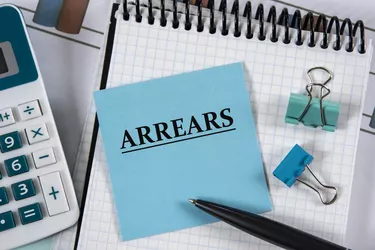
While the term, "paid in arrears" might sound as though you're late on a payment, that typically isn't the case. Some payments are paid or due in arrears -- after the employee has worked or the consumer has received services or goods. Other payments are due or paid in advance -- prior to the completion of work or availability of services.
Your Paycheck
Video of the Day
Employees are often paid in arrears. A typical two-week pay period might end on a Friday, with the employee's pay check generated the following Friday. An employee under that arrangement is working in arrears, because he's paid at least a week after he worked the hours.
Video of the Day
Business owners who provide services often paid in arrears as well. For example, when you call a plumber, he fixes your sink, then you pay him. If you hire an attorney with an hourly billing arrangement, you'll likely get an invoice for one month's billable hours, which reflects work the attorney already completed, and you'll pay for that work in arrears.
Some payments are paid or due in arrears -- after the employee has worked or the consumer has received services or goods.
Government Benefits
Many government benefits are paid in arrears. For instance, Social Security recipients receive their October benefit in November. Veterans receiving disability benefits from the Veterans Administration also receive benefits in arrears -- monthly payments reflect the previous month's benefits.
Business Accounts
Businesses that purchase goods or services often have accounts with net 30, net 60 or net 90 terms. These accounts are paid in arrears, sometimes months after products are delivered. For example, a restaurant owner might receive an invoice from a food supplier with a net 30 term.
The statement reflects food delivered during the previous month, and payment is expected within 30 days of the invoice date -- providing the restaurant owner almost 60 days from delivery to make payment. These terms make it possible for business owners to manage their cash flow and anticipate expenses well in advance of making payments.
Utility Bills
Since many utility charges are based upon your usage, those bills typically are paid in arrears, to give the utility company time to send a representative to your home to read your meter. For instance, electric and water customers in Greenfield, Indiana, may have their meters read between April 20 and 30. Their bills for that time period are due on May 25 for April's usage.
Credit Card Payments
Credit cards are a classic example of paying in arrears; you're purchasing goods or services, but not paying for them until the following months. Most credit card providers offer at least 25 days from the time of a purchase until the payment for that purchase is due. In addition, if you pay your bill within the grace period, you'll avoid interest charges.